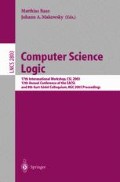Abstract
The functional paradigm of computation has been widely investigated and given a solid mathematical foundation, initiated with the Curry-Howard isomorphism, then elaborated and extended in multiple ways. However, this paradigm is inadequate to capture many useful programming intuitions, arising in particular in the development of applications integrating distributed, autonomous components. Indeed, in this context, non-determinism and true concurrency are the rule, whereas functional programming stresses determinism, and, although it allows some degree of concurrency, it is more as a “nice feature to have” rather than a primary assumption.
This paper is part of a program the ambition of which is to provide a logical foundation to a set of programming intuitions which, until now, have not been adequately accounted for. In particular, we are interested in the intuitions which lie behind the concept of transaction, a powerful and essential concept in distributed component-based application development. This concept is independent of the application domain and usually captured in an abstract form in middleware architectural layers.
We claim here that proof-construction, and more precisely proof-net construction in Linear Logic, offers the adequate basis for our purpose. We outline the relation, which is of the same nature as the Curry-Howard isomorphism, between transactional concepts and mechanisms on one hand, and proof-net construction on the other. Finally, we describe an algorithm which performs concurrent proof-net construction, where each expansion step is viewed as a transaction. Conflicts between such transactions are minimised using general topological properties of proof-nets, based on a variant of the notion of “domination tree”, introduced and proved here.
Access this chapter
Tax calculation will be finalised at checkout
Purchases are for personal use only
Preview
Unable to display preview. Download preview PDF.
References
Andreoli, J.M.: Focussing and proof construction. Annals of Pure and Applied Logic 107, 131–163 (2001)
Andreoli, J.M.: Focussing proof-net construction as a middleware paradigm. In: Voronkov, A. (ed.) CADE 2002. LNCS (LNAI), vol. 2392, pp. 501–516. Springer, Heidelberg (2002)
Girard, J.Y.: Linear logic. Theoretical Computer Science 50, 1–102 (1987)
Danos, V., Regnier, L.: The structure of multiplicatives. Archive for Mathematical Logic 28, 181–203 (1989)
Murawski, A., Ong, C.: Dominator trees and fast verification of proof nets. In: Proc. of 15th Conference on Logic in Computer Science, Santa Barbara, Ca, U.S.A., IEEE Computer Society Press, Los Alamitos (2000)
Habert, L., Notin, J.M., Galmiche, D.: Link: A proof environment based on proof nets. In: Egly, U., Fermüller, C. (eds.) TABLEAUX 2002. LNCS (LNAI), vol. 2381, pp. 330–334. Springer, Heidelberg (2002)
Reisig, W.: Petri Nets. Springer, Heidelberg (1985)
Marti-Olliet, N., Meseguer, J.: From petri-nets to linear logic. Mathematical Structures in Computer Science 1, 69–101 (1991)
Bruni, R., Montanari, U.: Transactions and zero-safe nets. In: Ehrig, H., Juhás, G., Padberg, J., Rozenberg, G. (eds.) APN 2001. LNCS, vol. 2128, pp. 380–426. Springer, Heidelberg (2001)
Lomazova, I., Schnoebelen, P.: Some decidability results for nested petri nets. In: Bjorner, D., Broy, M., Zamulin, A.V. (eds.) PSI 1999. LNCS, vol. 1755, pp. 198–207. Springer, Heidelberg (2000)
Ciardo, G.: Petri nets with marking-dependent arc cardinality. In: Valette, R. (ed.) ICATPN 1994. LNCS, vol. 815, pp. 179–198. Springer, Heidelberg (1994)
Milner, R., Parrow, J., Walker, D.: A calculus of mobile processes. Information and Computation 100, 1–77 (1992)
Fournet, C., Gonthier, G.: The reflexive cham and the join-calculus. In: Proc. of 23rd Symposium on Principles of Programming Languages, St. Petersburg Beach, Fl, U.S.A., pp. 372–385. ACM Press, New York (1996)
Bruni, R., Laneve, C., Montanari, U.: Orchestrating transactions in join calculus. In: Brim, L., Jančar, P., Křetínský, M., Kucera, A. (eds.) CONCUR 2002. LNCS, vol. 2421, pp. 321–337. Springer, Heidelberg (2002)
Author information
Authors and Affiliations
Editor information
Editors and Affiliations
Rights and permissions
Copyright information
© 2003 Springer-Verlag Berlin Heidelberg
About this paper
Cite this paper
Andreoli, JM., Mazaré, L. (2003). Concurrent Construction of Proof-Nets. In: Baaz, M., Makowsky, J.A. (eds) Computer Science Logic. CSL 2003. Lecture Notes in Computer Science, vol 2803. Springer, Berlin, Heidelberg. https://doi.org/10.1007/978-3-540-45220-1_3
Download citation
DOI: https://doi.org/10.1007/978-3-540-45220-1_3
Publisher Name: Springer, Berlin, Heidelberg
Print ISBN: 978-3-540-40801-7
Online ISBN: 978-3-540-45220-1
eBook Packages: Springer Book Archive

